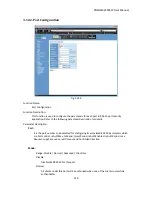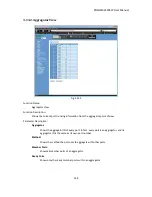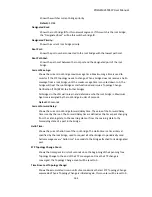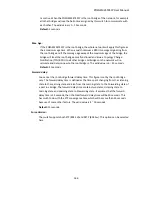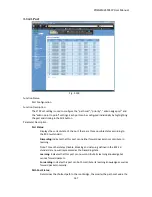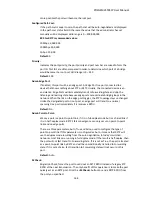
POEGEM24T4SFP
User
Manual
155
3.13.
Trunking
Configuration
Port
Trunking
is
used
to
Aggregate
Ports
into
a
logical
trunk
usually
called
Link
Aggregation.
Link
Aggregation
can
bundle
more
than
one
port
with
the
same
speed,
full
duplex
and
the
same
MAC
address
to
be
a
single
logical
port,
thus
the
logical
port
aggregates
the
bandwidth
of
these
ports.
This
allows
the
switch
to
aggregate
multiple
ports
together
to
form
a
high
bandwidth
backbone
link.
The
POEGEM24T4SFP’s
support
two
kinds
of
trunking
methods:
LACP:
Ports
that
are
using
Link
Aggregation
Control
Protocol
(according
to
the
IEEE
802.3ad
standard)
as
their
trunking
method
can
choose
their
unique
LACP
Group
ID
(1
‐
8)
to
form
a
logical
“Trunked
Port”.
The
benefit
of
using
LACP
is
that
a
port
makes
an
agreement
with
its
peer
port
before
it
becomes
a
ready
member
of
a
“Trunk
Group”
(also
called
Aggregator).
The
POEGEM24T4SFP’s
LACP
function
does
not
support
the
following:
-
Link
Aggregation
across
switches
-
Aggregation
with
non
IEEE
802.3
MAC
links
-
If
the
ports
are
operating
in
Half
Duplex
mode
-
Aggregate
the
ports
with
different
data
rates
Static
Trunk:
Ports
that
are
using
Static
trunk
as
their
Trunk
method
can
choose
their
unique
Static
Group
ID
(also
1
–
12,
this
static
group
ID
can
be
the
same
as
a
LACP
group
ID)
to
form
a
logical
“Trunked
Port”.
A
benefit
of
using
Static
Trunking
is
that
a
port
can
become
a
member
of
a
trunk
group
without
any
handshaking
with
its
peer
port.
This
can
also
be
a
disadvantage
because
the
peer
ports
of
the
Trunk
group
may
not
know
that
the
ports
should
be
aggregated
together
to
form
a
trunk
group.
Using
Static
trunking
at
both
ends
of
the
link
is
highly
recommended.
The
POEGEM24T4SFP
allows
up
to
12
LACP
trunk
groups
and
another
additional
12
trunk
groups
for
static
trunking.
Only
12
groups
can
be
used
at
one
time.
Each
trunk
group
can
contain
a
maximum
of
12
member
ports.
Summary of Contents for POEGEM24T4SFP
Page 68: ...POEGEM24T4SFP User Manual 68 Move to the previous page Next Page Move to the next page...
Page 82: ...POEGEM24T4SFP User Manual 82 Fig 3 42 Fig 3 43 Fig 3 44...
Page 89: ...POEGEM24T4SFP User Manual 89 Fig 3 48...
Page 106: ...POEGEM24T4SFP User Manual 106 Fig 3 71 Fig 3 72...
Page 108: ...POEGEM24T4SFP User Manual 108 Fig 3 75 Fig 3 76 Fig 3 77 ARP...
Page 109: ...POEGEM24T4SFP User Manual 109 Fig 3 78 ARP Fig 3 79 ARP Fig 3 80 ARP Fig 3 81 ARP...
Page 110: ...POEGEM24T4SFP User Manual 110 Fig 3 82 ARP Fig 3 83 ARP Fig 3 84 ARP Fig 3 85 ARP...
Page 111: ...POEGEM24T4SFP User Manual 111 Fig 3 86 ARP Fig 3 87 ARP Fig 3 88 ARP Fig 3 89 ARP Fig 3 90 ARP...
Page 112: ...POEGEM24T4SFP User Manual 112 Fig 3 91 IPv4 Fig 3 92 IPv4 Fig 3 93 IPv4...
Page 115: ...POEGEM24T4SFP User Manual 115 Fig 3 105 IPv4 Fig 3 106 IPv4 Fig 3 107 IPv4...
Page 116: ...POEGEM24T4SFP User Manual 116 Fig 3 108 IPv4 Fig 3 109 IPv4 Fig 3 110 IPv4...
Page 117: ...POEGEM24T4SFP User Manual 117 Fig 3 111 IPv4 Fig 3 112 IPv4 Fig 3 113 IPv4 Fig 3 114 IPv4...
Page 118: ...POEGEM24T4SFP User Manual 118 Fig 3 115 IPv4 Fig 3 116 IPv4 Fig 3 117 IPv4...
Page 119: ...POEGEM24T4SFP User Manual 119 Fig 3 118 IPv4 Fig 3 119 IPv4 Fig 3 120 IPv4...
Page 120: ...POEGEM24T4SFP User Manual 120 Fig 3 121 Action Fig 3 122 Rate Limiter...
Page 121: ...POEGEM24T4SFP User Manual 121 Fig 3 123 Port Copy Fig 3 124 DMAC Filter...
Page 211: ...POEGEM24T4SFP User Manual 211 Fig 4 3...
Page 238: ...POEGEM24T4SFP User Manual 238 2 1 3 1 4 1 5 1 POEGEM24T4SFP acl...










